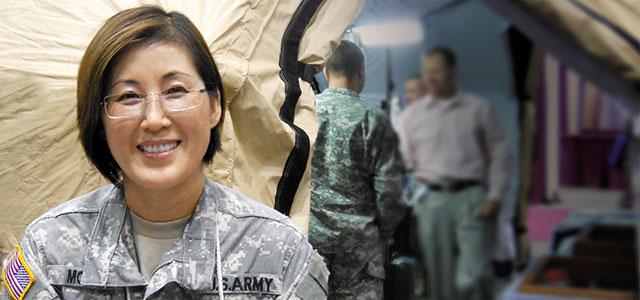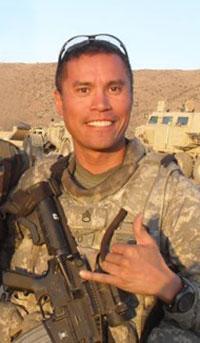
Misun Serena Moser at an American Association of Critical-Care Nurses recruiting event
Honoring Veterans
In communities across the country, many civilians are unaware of the number of military veterans walking among them.
UCSF is no exception. There are numerous veterans sprinkled among UCSF’s students, faculty and staff. In recognition of November’s Veterans Day, we honor two of these veterans by telling their stories.
Maternal Force: Misun Serena Moser
When Misun Serena Moser joined the US Army Reserve in April 2002, she did so largely as an act of solidarity with her son, who was joining the Air Force at the time.
The subsequent 13-plus years in the military have had their ups and downs, says Moser – who is currently a student in the Family Nurse Practitioner Program at UC San Francisco School of Nursing – but they have only deepened her commitment to veterans. “I’m always very excited to take care of them,” she says.
A Long and Winding Road
Moser’s path to both nursing and the military was anything but run-of-the-mill.
In the 1980s, she arrived in the US from Korea, where she’d been working as a dietitian and where she had met her ex-husband, a rocket scientist, who came to the US as part of an exchange program and then decided to pursue his doctorate at the University of Maryland. When her marriage ended, Moser found herself a single mother who needed to find a way to support her children. She chose nursing.
She got her RN training at Colorado Mesa University and became a medical-surgical nurse in Colorado, where she worked between 1997 and 2002. But when her son chose to join the Air Force, Moser felt she needed to act.
“I was criticized by my family, but I didn’t feel secure to let him go by himself.… He is my first child, and I am a very strong mother. That’s me. I wanted to understand the system and be prepared to support my son,” says Moser. “I also know war and the military are often necessary to protect our freedom.”
She joined the US Army Reserve, where she’s worked herself up to the rank of major, and says, “I’ve come to understand the military system pretty well, including how I could support my son when I needed to, [which was especially important] when he deployed to Iraq [from May to December 2009].”
In the meantime, Moser continued to pursue her nursing career, moving to Southern California and eventually winding up at the VA Greater Los Angeles Healthcare System. She had a variety of roles during her many years there, but the bulk of her time was as an intensive care unit (ICU) nurse.
“I mostly took care of older vets who had serious health problems,” she says. “I feel like I am a family member for them, because I’m a veteran too.”
Then, in 2011, she transferred to the Department of the Army at Fort Irwin National Training Center, in San Bernardino County, where as a civilian nurse case manager she coordinated medically undeployable active-duty soldiers’ Medical Evaluation Board process – until she herself deployed to Kuwait from July 2012 through June 2013. There, she took responsibility for daily operation of a 24-bed combined ICU and step-down unit at the 349th Combat Support Hospital (Forward), Camp Arifjan, Kuwait.
“We received soldiers from Iraq and Afghanistan,” she says. “I treated them as my sons – I had such empathy and sympathy. I really love taking care of people on the front lines, because they are the backbone of the military.”
PTSD and Beyond
The rewards of treating active-duty soldiers might have been all she took with her from the time in Kuwait, except that was also where sexual harassment – which had begun during her pretraining for combat deployment – escalated. “It’s complicated and difficult…an invisible war,” says Moser. “But as a soldier I had to survive, and as a Christian I tried to work with her [the harasser] until I recognized I had to report it.”
The event and its aftermath caused Moser to experience post-traumatic stress disorder (PTSD). Shortly after returning to civilian employment at Fort Irwin and to her Army Reserve unit in California for a short time, she says she chose to transfer to an Army Reserve unit and civilian job out of California to avoid contact with her alleged sexual harasser.
“I was very embarrassed about my PTSD at the beginning, but I finally accepted it and went through treatment,” she says.
She relocated to Oregon and worked for the VA Portland Health Care System, where she worked as a critical care unit nurse and utilization management case manager until she heard of her acceptance to UCSF in July 2014.
Despite the unfortunate experiences that led to her PTSD, Moser still deeply values her military experience and the soldiers she has known and treated.
“I will continue to serve veterans or soldiers,” she says. “Without having a soldier’s experience, including service-related injuries and traumas, the civilian population could not fully understand veterans’ dilemmas and needs. I have a lot of commonality. I understand where they’re coming from and can help find the best option for them, carewise.”
Finding Balance: Joey Convento
Joey Convento’s job as UCSF’s arts and events producer speaks to his strong belief in creating balance in life. “It’s something everyone needs,” he says. “Here it might be an hour of entertainment to get up from your desk, but for me, it’s a metaphor for when I got back, that need to have a balance.”
 Joey Convento in Afghanistan By back, he means returning from the conflict in Afghanistan, where Convento spent a year as a combat engineer, from 2008 to 2009. Combat engineers primarily supervise, serve or assist as a member of a military team when it is tackling rough terrain in combat situations. Convento, a staff sergeant who enlisted in the US Army Reserve directly out of high school in 1989, says that during his time in Afghanistan, his job largely involved seeking out explosive devices and disarming them.
Joey Convento in Afghanistan By back, he means returning from the conflict in Afghanistan, where Convento spent a year as a combat engineer, from 2008 to 2009. Combat engineers primarily supervise, serve or assist as a member of a military team when it is tackling rough terrain in combat situations. Convento, a staff sergeant who enlisted in the US Army Reserve directly out of high school in 1989, says that during his time in Afghanistan, his job largely involved seeking out explosive devices and disarming them.
“We mostly used robotics, and we had years of training and new, mine-resistant armored vehicles,” he says, downplaying the dangers. But riding down a dusty road at 3-5 miles per hour each day, knowing that ambush is a distinct possibility as you look for subtle signs that there’s an improvised explosive device (IED) buried beneath the dirt – and then exploding the device remotely – demands a steady courage that most American civilians will, thankfully, never have to test.
A Quarter Century of Service
While the time in Afghanistan wasn’t Convento’s first deployment, it was the first time he was overseas in the middle of an armed conflict.
“It was peacetime when I joined the Reserve, and I thought 3 to 5 years max, and I could use the Montgomery GI Bill to get me through college and maybe travel,” says the San Francisco native. Though the travel’s been limited to a couple of humanitarian missions in Honduras and Panama, and a stint in Germany, Convento did take advantage of the GI Bill, eventually earning his MBA degree from San Francisco State. He attended school while working at UCSF, where he started in 1992.
Yet he’s never found a reason to leave the military, partly because he’s come to appreciate the camaraderie with his “brothers” in the Petaluma reserve unit.
That camaraderie grows with every weekend of service and every deployment. Convento’s first two-year deployment was stateside in 2004. “Our job was to burn chemicals used in weapons,” he says. “While [the US military was] seeking out WMDs [weapons of mass destruction] overseas, we were destroying ours.”
After that deployment, he returned to UCSF, and it was then he became an event producer.
Afghanistan
But in 2008, Convento’s entire reserve unit was called to active duty out of Bagram Air Base and Forward Operating Base Orgun-E, in eastern Paktika Province, Afghanistan.
He says the teams would assess the landscape from monitors in their vehicles, looking for signs of disturbed terrain – darker soil, litter, anything that looked out of the ordinary. “The roads were riddled with IEDs,” he says. “You might find two a day.”
Many of the devices were set to trip when a vehicle rolled onto an underground ramp. There was also the risk of what Convento calls a “daisy chain,” when one IED is linked to another buried 25-30 feet away. Once the team identified a device, they would send in a robot that would detonate it, while the combat engineers moved what they presumed was a safe distance away.
“We were pretty successful; there were no fatalities from our unit…[but] we received quite a number of Purple Hearts for injuries sustained in the war,” he says.
He adds those first days in the field are life changing. “You’re sitting there, looking at folks on your right and left, and you know it’s not like doing this back in training at Camp Roberts. You see something wrong when you’re back home, you can correct it,” he says. “When you’re in a prone position, getting shot at, it’s real.”
He remembers all too well a close friend being shot numerous times while protecting Convento and his fellow soldiers when they came under heavy fire. The friend lived but had to be medevaced out.
“If not for him, we would have been overrun.… He’s a real hero,” says Convento.
Adjusting to Civilian Life Again
Until now, Convento has been reluctant to speak about his military service outside of the close-knit group of fellow reservists in Petaluma, who became that much closer after their active-duty deployment. “Since we came back, we hang out a lot more; every other month we’ll do something, like a Giants game,” he says.
And after hearing of a suicide of a comrade and knowing others who have had to recover from wounds or injuries, Convento feels lucky that his adjustment to coming home was relatively smooth.
It also helps, he says, that his reception in the Bay Area has always been extremely positive. “The only time I wear my uniform is during weekend drills and parades, in Petaluma and Santa Rosa [where the reserve unit is stationed]. If I’m standing at a Starbucks, oftentimes, someone offers to buy my coffee. I’m very grateful.”



